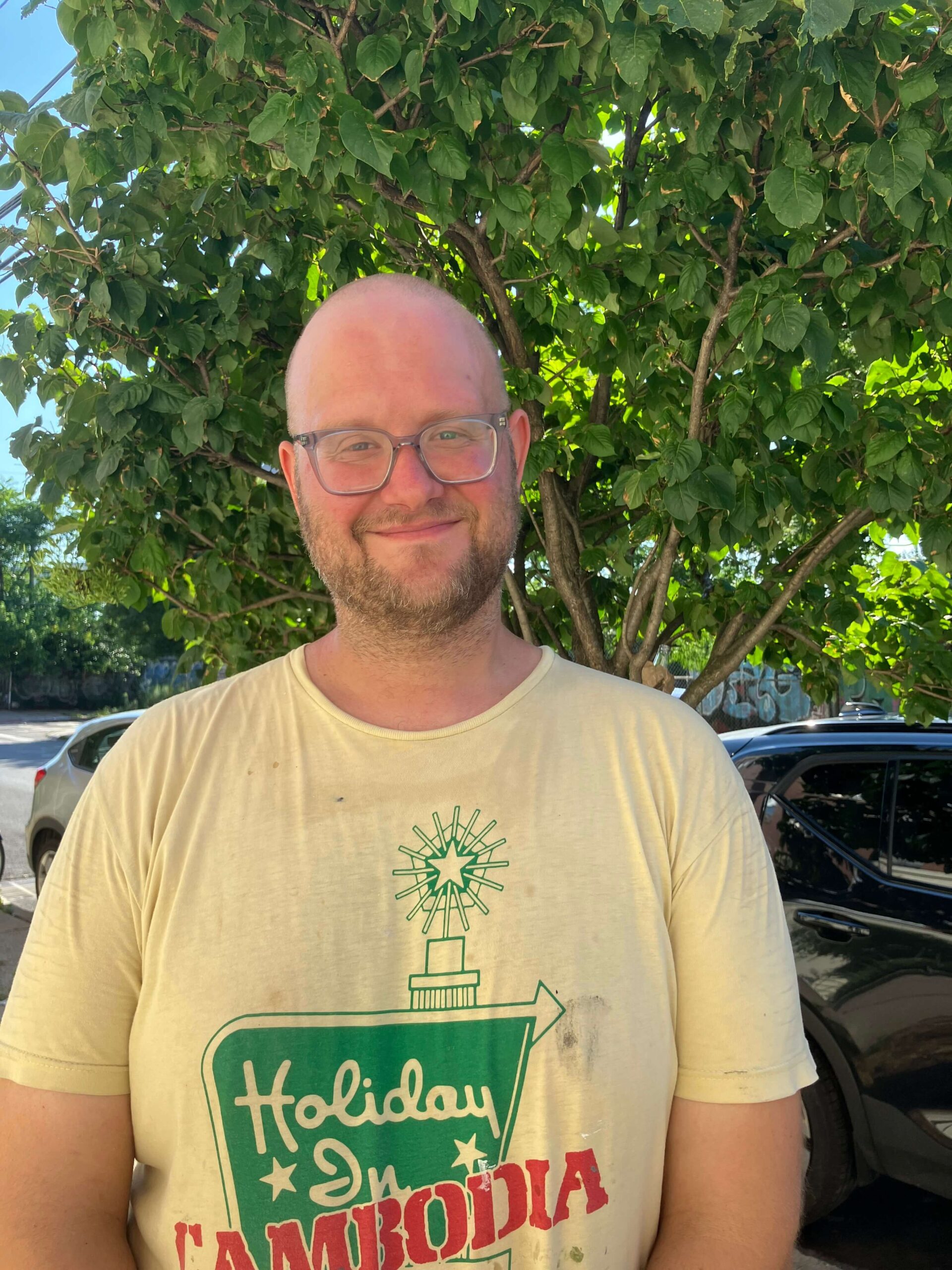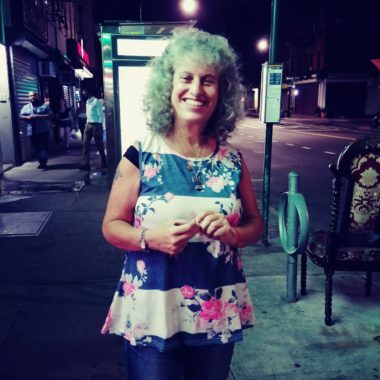The question this month was to recall an experience in which they were discriminated against or treated unfairly.
James “Papa” Johnson – One time me and my brother and my homeboys were at my uncle’s crib in East New York…and it was time for us to go home. I forgot something upstairs, and when we came back down, the five-oh were all out in front of the building, and my boys were all lined up against the building. They told one of the guys to take his shoes off. They asked for my ID and I was like, why you askin’ me for my ID? So after they harassed us they let us go, and we were walking to the train station, and they followed us all the way!
How were following you?
It was a paddy wagon! It followed us all the way to the train station! There was like, five, six of us. And they were on their horns, yelling at us, saying keep on walkin.’ So we got on the train, and when we got off the train at the Lafayette station, there was another cop car at the train station at Fort Greene, it was like they were waiting for us!
It wasn’t the same cops?
No, but it was like, how did they know we were there? It was like they had been communicating. They followed us all the way to the Fort Greene projects. It was like they wanted us to say something to them so they could do something to us.
Tyrone Cunningham – I went to a nice resort at Montego Bay with my fiancée Carmen. There was this one incident. We went into the buffet, and you’re supposed to wear a shirt. I had a towel, and I wrapped it around me, so I was completely covered. I wasn’t getting anything to eat, I was just waiting for Carmen to get her food. So a local worker, a Jamaican lady, came up to me. Now she’s African-American, and I’m African-American too. And she approached me and said, sir, you can’t be in the food area without a shirt on. Mind you, I had a towel wrapped all around me, like a blanket. But I proceeded to walk out. And a white male walked right past me, right into the buffet, with just swimming trunks on, and no top. He picked a plate up, put food on the plate, and no one approached him. Not the chefs, not the waiters. And that same lady, the same African-American, didn’t approach him to say, sir, you can’t be here with no top on.
And how were you feeling?
I was thinking, you get the most hate from within your race. Racism is taught from within race, not taught from outside of race. Like, I’m a black male. You’re a white female. I’m not taught to hate you because of your skin color. It’s always from within.
Jacob – I’m a screen writer and I was living with a friend who was somewhat of a collaborator. He was a director, didn’t really do much writing himself. And I had a script that I kind of offered up, like, we can do this together. And he had a couple of friends who he wanted to be producers on the project….They were more his friends than mine, and I just wasn’t sure I wanted to work with them. So I said, well, this is my script, so before we make that decision I want to talk through it. So then he sort of set me up, put me in a social situation with them that would make it difficult for me to say no to them.
He had writer’s block and couldn’t write a script of his own, and I was giving this to him. And then he put me in this awkward situation. I said you tried to manipulate me, you can’t use my script. I wanted him to own it. I thought that eventually he would apologize. This was a kid who’d been a close friend of mine since I was about eight years old. But this was the kicker. He said, I’m not owning it, and I’m moving out of the house.
So not only did he do this manipulative thing, but he rejected you as a friend.
Yes, but what’s interesting to think about is, if he were sitting here, and he was having this conversation with you, I was a crazy person, and he was this righteous, great guy who had been victimized because this crazy person got threatened by the fact that he wanted to do something magnificent with this script.
So he did move out?
Yeah, he moved out. And I would still be open to go back to being friends with him.
Jon Melamed
In 2000 I left New York and went to college in New Hampshire.
Over the first couple of months my new roommates and I were friends, everything was good. One day we were splitting a thirty-rack of beer. One of the guys said, hey, quit being Jewish. Give me the money for the beer. You’re being wicked Jewish right now! Pay me for the beer! And I said, I can’t help it! I was born that way! And they were like, oh shit. You’re Jewish! And I was like yeah, and they were like, I never met a Jew before. And I was like, really? They said you’re really cool and we really like you, and it’s unfortunate that you’re not gonna go to heaven.
How did you know the other guy never met a Jew?
I asked him and he said no, he never met a Jew before either. But they ended up being my best friends for the year.
Where were they from?
Some part of New Hampshire.
Jamil Kennedy Judeh – I went to prep school in Bay Ridge, and I was the only Muslim American in the whole school. And 9/11 happened. A lot of the kids in my class had parents who were fire fighters, policemen… And everything was very emotional.
You mean that day.
Not only that day. I got into an altercation almost daily. And in a school like that, that kind of thing never happened. It was a prep school!
What kind of altercations?
Fist fights.
Would they call you names?
Oh, yeah! I heard it all. Everything in the book.
Were you scared to go to school?
No. I guess I was naïve.
This went on the whole year?
Oh, yeah. It followed us for quite some time. My sister and my cousins also went to that school. We all had bad experiences. Me and my sister a little bit more. My older cousins had lost a lot of their identity by that time…
They were more assimilated.
Yeah. Way more assimilated. But it was all very intense. We had parents that were lost at that school.
Tameka White – I’ve been working at my current place of employment for 20 years. I’m the only African American person. We’ve gone from seven people to 32 people.
So the company expanded.
Yes. And a new person came in. And she was 23, young, blond, and had blue eyes, and she got a vice president of operations position without knowing what our company did at all. And they brought in another couple of very young people who are running the financial planning department. One of them is the daughter of one of the salespersons that had been there for about seven years. Another one is the owner’s niece’s friend. Another young guy came in who ended up being promoted despite complaints about his work.He’s the godson of the owner’s friend. So there is a lot of nepotism going on.
Have you told the bosses how you feel?
Well, like, the blue-eyed one, she’s a vice president, so when I complained about that they gave me director of operations, which is a level above vice president, but I don’t do anything different. It’s just a title. They changed everyone’s title. If you look on the website everyone’s a vice president, and everyone’s a director of something.
Does the blue-eyed one get more pay than you do?
No, she doesn’t get more compensation, but she is the vice president of operations, so eventually she will get as much as I do.
Have your feelings about your job changed?
They have. There’s no loyalty. What I’ve given doesn’t seem to count for much. And I was mad, but now I’m not. I’m pretty much, it is what it is, I can’t go in there and be upset about it, what I can do is change the situation by getting out of it. I’ve given 20 years, and I have more to give, just not here.
So you’re looking beyond this.
Yes. Yes. I have to.
Stiliani
In 2016 I was working for two guys in a ceramic fabrication shop. I’m an artist, and I do good work. But this was when Hillary Clinton was running against Trump. I was a Bernie supporter. I was hardcore for Bernie. And my bosses were like, if you were a woman, you would vote for Hillary.
They started dissing you for not supporting Hillary.
Yeah. They would say nonsense like, well, Roe V. Wade doesn’t affect me.
Were you friends with them?
When I was in school I wanted to work for their company so much. I admired them. I worked so hard for them.
You were happy to get the gig?
I was delighted. I would show up early, work my ass off.
And you were perfectly satisfied to work there until the presidential primary.
Yeah. They started to get really disgusting. There was just a lot of “mean girl” stuff going on, and I didn’t realize it at first because I had my bosses on such a pedestal. I had many reasons why I didn’t think that the Clinton administration was good for a lot of people. And then Trump won, and I was still working there, and at this point they were being, like, awful. They would go on these crazy rants.
Honestly I don’t remember that much after that. At some point they had me casting two tables I hurt my back really bad. And I got fired!
You got fired after you wrenched your back?
I asked not to have to (do heavy lifting) and then two or three weeks later they asked me for some tax forms, and right after I handed them in, they asked me to go. But at that point it was so unpleasant that they did me a favor.










